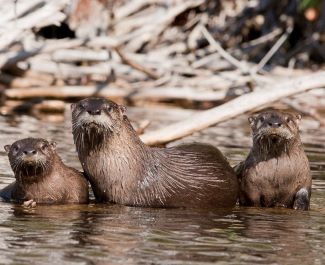Together for Wildlife - Goal 2
Data, information, and knowledge drive better decisions
We will make new investments in biological, social, cultural and economic data collection.

The right data, information, and knowledge are essential for successful wildlife stewardship. Acquiring and sharing the right data, information, and knowledge will require that our data and knowledge systems be modernized in collaboration with Indigenous governments, local governments, resource industries, non-government organizations and the public.
Under the strategy, we will make new investments in biological, social, and economic data collection, cumulative effects assessments, monitoring, innovative population modelling and information management systems.
These tools, processes and systems will improve the availability, accessibility and reliability of wildlife stewardship data for all users. This renewed approach will better inform resource stewardship decisions and will support the relationships and structures that enable investments from other organizations and partners.
We commit to the following Actions 4-7 to achieve Goal 2
Action 4 - Expand biological, social, and economic data and information
We will expand biological, social, and economic data and information. For example, we will fill critical gaps in wildlife monitoring and inventory, develop wildlife population and habitat supply models, and better understand the effects of climate change on wildlife. We will ensure consistent standards are followed to collect and analyze this information.
Work completed and underway
- Deliver wildlife monitoring, inventory and research projects across the province each year
- Share information with the public about what those projects accomplished
- Provide information about wildlife and ecosystems to provincial databases
- In 2021, released a management plan for Big Horn Sheep in the Kootenay Region (PDF, 4.9MB)
- Posted Towards a Big Game Inventory and Monitoring Strategy for British Columbia (PDF, 3.3MB)
- Work collaboratively with First Nations and other interested parties to identify priorities and develop multi-year wildlife monitoring and inventory plan
- Work to determine and identify where there are information gaps in social and economic data
Action 5 - Support wildlife research
We will support priority research for wildlife stewardship through contributions to post-secondary institutions. These contributions will leverage other sources of funding and build stronger partnerships between independent and government researchers and managers. We will broadly share the results of this research with British Columbians.
Work completed and underway
- In 2020-2021 provided financial support for wildlife research chairs (UVic and UNBC)
- In 2021-2022 completed a project to discover ways of supporting wildlife research. The final report is now available: A New Vision for Wildlife Science in British Columbia (PDF, 2.6MB)
- In 2022, supported six student research projects proposals through the Interior University Research Coalition which looked at wildlife issues as diverse and complex as Indigenous methods and cultural approaches to wildlife and habitat, competition between feral horses and native ungulates, reintroducing grizzly bears to the Southern part of the province, and the effects of vehicle activity on Dome Mountain Sheep in northern B.C. For a list of recipients and details on their projects, visit the grant recipients page.
- In 2023, through a partnership with the Habitat Conservation Trust Foundation (HCTF), provided ten $20,000 academic scholarships to master’s and PhD candidates undertaking research that will support a positive impact on stewardship, management, policy, or decision making of wildlife in BC. For a list of recipients and details on their projects see HCTF's news release.
- Deliver 2024 Together for Wildlife scholarships through HCTF. Call for proposals closed May 1, 2024, with more information available at HTFC's scholarship page.
Action 6 - Foster citizen science
We will develop a citizen science framework to provide new opportunities for British Columbians to partner in wildlife stewardship data collection and monitoring. We will build on existing citizen science initiatives in British Columbia and examples from other jurisdictions and use this information to support decision-making.
Work completed and underway
- Support research at the University of Victoria that looked at how to manage and collect community science data.
- Continue discussions with internal and external partners on citizen science
- Deliver community science projects in regions
- Invest in community science platforms such as Moose Tracks and Wildcam.
- Completed report on a Community Science Framework - Phase 1 (PDF 5.4 MB)
- Develop and begin to implement an approach to expand community science
- Keep track of how citizen and community science can help manage species and enhance decision-making about conversation
Action 7 - Ensure wildlife and habitat data are accessible, reliable and integrated
We will ensure wildlife and habitat data are accessible to everyone, are reliable and integrated, and include wildlife harvest statistics, wildlife inventory and monitoring data, and research findings. We will complete the ongoing Fish and Wildlife Data and Licensing Transformation project and collaborate on other initiatives, such as the Species and Ecosystems Information System Modernization project, to consolidate, replace, or enhance outdated information systems for wildlife and ecosystems.
Work completed and underway
- Develop a new fish, wildlife and habitat information system (BioHub)
- Continue to implement the Fish and Wildlife Data and Licensing Transformation project, focusing on trapping and compulsory inspection/reporting
- Posted Big Game Harvest statistics with helpful charts and visuals
- Make changes to how we survey hunters and manage data so that we can better understand trends over time.
- Continue to implement and broaden open data policies across government systems to make data publicly available.
- Made it mandatory for hunters to report their hunting results on the new Wildlife Information and Licensing Data system web site (WILD)
